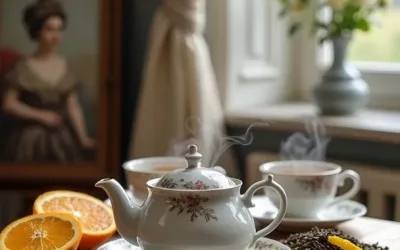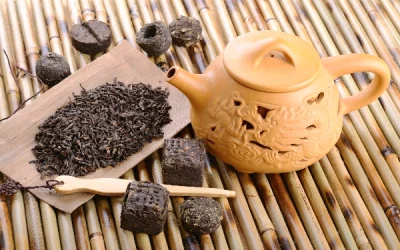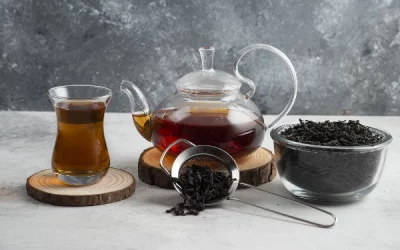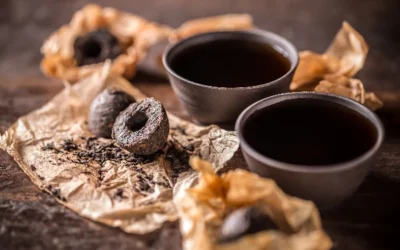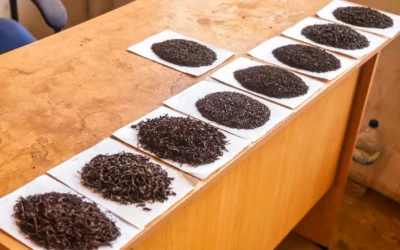Are you curious about black tea caffeine and how it affects your health? If you’re like many, you may be drawn to black tea for its rich flavour and potential health benefits. In this article, I’ll take you on a journey through the caffeine content found in black tea, exploring everything from its benefits and risks to comparisons with other beverages. You’ll discover how different types and brewing methods influence caffeine levels and what that means for your morning cup. Whether you’re interested in boosting your cognitive function or learning how to manage side effects, there’s plenty of valuable information ahead. Dive in to uncover how black tea can fit into your health routine!
Table of Content
- What is the caffeine content in black tea?
- How does the caffeine content in black tea compare to other beverages?
- What are the health benefits of black tea caffeine?
- What are the potential side effects of black tea caffeine?
- How does black tea caffeine interact with medications?
- What is the recommended dosage of black tea caffeine?
- How can you reduce the caffeine content in black tea?
- Is black tea a better choice than coffee?
- Conclusion
- Resources
What is the caffeine content in black tea?
The caffeine content in black tea can vary depending on several factors, including the type of tea leaves used, the method of processing, and the brewing time and temperature. On average, an 8-ounce (240-milliliter) cup of black tea contains about 40 to 70 milligrams of caffeine.
Factors that influence the caffeine content are:
- Type of black tea
- Processing
- Brewing time and temperature
- Leaf size
Black tea has carved out a unique spot, thanks to its rich flavour and moderate caffeine content. Typically, if you’re looking to get an energy boost without the jolt, black tea is a reliable choice.
For comparison, an average cup of coffee can deliver about 95 milligrams of caffeine, making black tea a milder, yet effective, pick-me-up. Your choice of tea type, how you brew it, and several other factors play crucial roles in determining the exact caffeine amount you get from a cup.
How much caffeine is typically in a cup of black tea?
A standard cup of black tea usually has between 40-70 milligrams of caffeine. However, different factors can push this number up or down.
- Measuring type: Black tea types like Assam and English Breakfast are generally on the higher end of this spectrum, whereas Darjeeling might have a bit less.
- Brewing time: A longer steeping time extracts more caffeine from the leaves.
- Leaf size: Finer tea leaves release caffeine faster than larger, whole leaves.
- Water temperature: Hotter water can release more caffeine from the leaves.
Generally, you can expect to enjoy a satisfying energy boost from black tea without the crash associated with high caffeine intake.
Does the type of black tea affect the caffeine content?
Yes, the type of black tea you choose does indeed affect its caffeine content.
- Assam: Known for its bold and malty flavour, Assam tends to contain higher levels of caffeine.
- Darjeeling: Often dubbed the ‘champagne of teas’, Darjeeling usually has lower caffeine levels, enhancing its delicate taste.
- Earl Grey: This tea, flavoured with bergamot oil, can have variable caffeine levels depending on the base black tea used.
- Ceylon: Grown in Sri Lanka, Ceylon black tea generally has moderate caffeine content balanced by its citrusy profile.
So when you’re selecting your next cup, consider the type to gauge the potential caffeine hit you’re signing up for.
How do brewing methods influence the caffeine levels in black tea?
The way you brew black tea can significantly influence its caffeine content. Different brewing methods can either enhance or diminish the effectiveness of caffeine extraction.
- Water temperature: Higher temperatures extract more caffeine.
- Steeping time: The longer the tea steeps, the higher the caffeine content. Aim for 3-5 minutes for a balanced brew.
- Amount of tea leaves: More tea leaves mean more caffeine.
- Type of tea bag or loose leaf: Loose leaf tea often has a higher caffeine content when compared to bagged tea due to better quality leaves.
- Water Temperature: Use hot but not boiling water (about 90-96°C).
- Steeping Time: Typically, steep for 3-5 minutes.
- Tea Quantity: More leaves or larger bags mean more caffeine.
- Leaf Size: Finer leaves often release caffeine faster.
- Re-brewing: Reusing tea leaves can yield less caffeine in subsequent brews.
Playing around with brewing techniques can help you tailor the caffeine content to suit your personal preferences.
During the 17th century, tea became a central part of British culture, thanks to figures like Catherine of Braganza, a Portuguese princess who married King Charles II. Catherine introduced the tea-drinking habit to the English court, which eventually popularised tea among the masses. Although tea had already entered England through trade, her influence helped it become a beloved staple. This shift made black tea a household name, providing a moderate caffeine option to the energy-seeking populace of that time.
I recall a time when black tea saved my day. I was in a small café in Copenhagen, tired from a long walk. I ordered an English Breakfast tea. The brew had just the right amount of caffeine to perk me up but not so much that I felt jittery. It was that perfect cup that highlighted how black tea can be the ideal balance between effectiveness and enjoyment. It made me appreciate the intricacies and art of tea preparation even more.
How does the caffeine content in black tea compare to other beverages?
Black tea is a beloved beverage for many, renowned for its robust flavour and stimulating effects. One of the primary reasons people enjoy black tea is its caffeine content, which provides a gentle kick of energy. But how does the caffeine in black tea compare to other popular drinks like coffee, green tea, and energy drinks?
Understanding the caffeine content in different beverages can help you make informed choices about what to drink based on your needs. Here’s a comprehensive table that shows the average caffeine content in common beverages.
Caffeine content comparison table
| Beverage Type | Average Caffeine Content (mg per 8 oz) |
|---|---|
| Black Tea | 40-70 |
| Green Tea | 20-45 |
| Coffee | 95-200 |
| Energy Drinks | 70-100 |
| Cola Soft Drinks | 22-46 |
| Decaf Coffee | 2-5 |
| Herbal Tea | 0 |
This table provides a quick reference to understand how much caffeine you’re consuming with each drink. Here, black tea sits somewhere in the middle, offering a moderate level of caffeine—more than green tea but less than coffee and most energy drinks. Herbal teas, often lauded for their calming properties, naturally contain no caffeine.
Why choose black tea for its caffeine content?
Choosing black tea for its caffeine content involves understanding its unique attributes:
- Moderate Stimulation: Black tea provides a balanced energy boost—enough to wake you up without causing jitters.
- Antioxidants: Rich in antioxidants like theaflavins and thearubigins, which contribute to overall health.
- L-theanine presence: This amino acid helps induce relaxation without drowsiness.
- Sustained energy: Offers a slower release of caffeine, preventing sudden energy spikes and crashes.
- Versatility: Can be enjoyed hot or iced, with various flavour options.
Exploring the caffeine content in these beverages highlights why black tea can be a fantastic choice for those seeking a moderate caffeine intake with additional health benefits.
How does caffeine in black tea affect your body?
Black tea caffeine, like the caffeine in other drinks, affects the body in several ways. Here’s what to expect:
- Mental Alertness: Boosts focus and concentration.
- Metabolic Rate: Can help increase the metabolic rate slightly.
- Heart Health: May offer cardiovascular benefits due to the presence of flavonoids.
- Smooth Digestion: Acts as a gastrointestinal stimulant.
- Mood upliftment: The combination of caffeine and L-theanine helps improve mood and reduce stress.
When you drink black tea, the caffeine starts affecting your body within about 15 minutes and continues to be active for several hours. Therefore, it’s best enjoyed earlier in the day.
Factors influencing the caffeine content in black tea
Several factors can impact the amount of caffeine in your cup of black tea:
- Tea Leaf Origin: Variations in climate and soil conditions can alter caffeine levels.
- Steeping Time: Longer steeping releases more caffeine.
- Water Temperature: Higher temperatures extract more caffeine.
- Leaf Type: Broken leaves and tea bags typically release more caffeine than whole leaves.
Knowing these factors can help you modulate the caffeine content to suit your preferences and needs.
Centuries ago, during the British Empire’s expansion, the demand for tea soared, particularly black tea. To ensure a consistent supply of this precious commodity, Britain started cultivating black tea in its colonies, most notably in India. The Indian state of Assam became synonymous with black tea production. This not only changed the tea industry but also significantly influenced local economies and lifestyles. Such historical dependencies forged deep connections between black tea and British culture, cementing its place in everyday life.
Years back, I dedicated my mornings to exploring different teas. The ritual of steeping a fresh pot of black tea not only helped me start the day with a clear mind but also introduced me to the rich tapestry of flavours each region had to offer. These moments provided a sanctuary of calm and focus, creating a cherished routine that I hold onto even today.
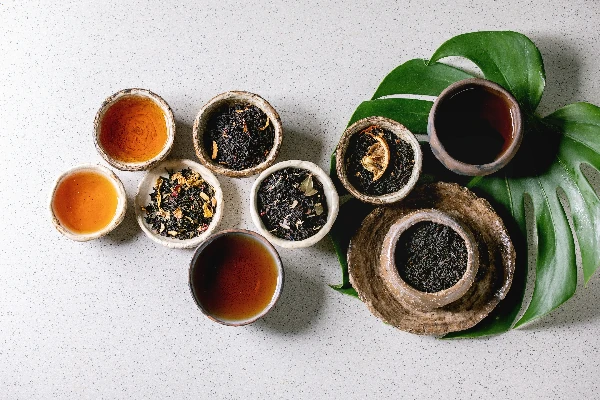
What are the health benefits of black tea caffeine?
Alright, let’s talk about everyone’s favourite pick-me-up: caffeine. But we’re not talking about just any caffeine—specifically, the caffeine in black tea. You know, that lovely, comforting brew that has a sophisticated association with British afternoons and those ridiculously cute teacups. Whether you are a die-hard coffee enthusiast sneering at an “inferior” tea or a devout tea drinker, stick around. Black tea packs a punch!
How does black tea caffeine improve cognitive function?
First off, if you’re finding it hard to focus on this text without drooling into a pit of despair and boredom, you might want to grab a cup of black tea. The caffeine in black tea is like a gentle tap on the brain’s shoulder, saying, “Hey, wake up!” It improves your mental alertness, attention span, and overall cognitive function.
- Enhanced alertness: Black tea’s caffeine kick-starts your brain like jumper cables to a car battery.
- Improved focus: Whether you’re tackling a heavy workload or a Sudoku puzzle, caffeine helps you zero in.
- Memory boost: Studies suggest that caffeine can improve short-term memory—handy when you’re cramming for an exam.
- Mental stamina: Prolong your attention span, making endless Zoom meetings slightly more bearable.
- Mood enhancement: It also releases dopamine, the ‘feel-good’ neurotransmitter that can lift your spirits.
Who doesn’t want to be just a tad sharper, especially when the 3 PM slump hits like a sandbag? Caffeine in black tea can be the slight push you need to conquer the world—or at least get through your emails.
What are the cardiovascular benefits of black tea caffeine?
Here’s the scoop: your morning cuppa can be as much a treat for your heart as it is for your taste buds. The caffeine in black tea helps in several ways:
- Improved circulation: Caffeine acts as a mild vasodilator, enhancing blood flow.
- Lowered blood pressure: Regular consumption can help maintain healthy blood pressure.
- Reduced cholesterol: Can help reduce levels of LDL, a.k.a. the “bad” cholesterol.
- Reduced stroke risk: Better cardiovascular health can lead to a reduced risk of stroke.
- Antioxidants: Black tea is packed with flavonoids which are antioxidants that protect your heart.
In essence, black tea isn’t just a sip of comfort; it’s a gulp of health benefits too. So, next time someone frowns upon your tea-drinking habits, simply say, “I’m doing it for my heart!”
Can black tea caffeine boost metabolism and aid in weight loss?
Fancy shedding a few pounds without trading your soul for a gym membership? Black tea might just be the friend you need. The caffeine in black tea can supercharge your metabolism, making it easier for you to burn calories even when you’re binge-watching Netflix.
- Increased metabolic rate: Caffeine boosts your body’s ability to burn calories.
- Fat oxidation: Helps in the breakdown of stored fats.
- Appetite suppression: Can reduce your hunger pangs, making you less likely to snack.
- Thermogenesis: Generates more heat in your body, which helps burn more calories.
- Energy boost: Makes you more likely to engage in physical activity.
Who knew that something as simple as sipping black tea could turn your body into a calorie-incinerating machine? Ok, maybe not that dramatic, but every bit helps, right?
Once upon a time in the late 19th century, the British were obsessed with tea. The London tea auctions were the breeding grounds for this obsession. Each auction was an event, and tea was taken as seriously as gold. Caffeine-filled black tea became a must-have commodity—not just for its taste but for its stimulating effects that kept the British Empire running like a well-oiled machine. They believed that a nation that drinks together, stays together. And hey, who can argue with an empire that once ruled half the world, fuelled by their beloved black cuppa?
So if black tea kept an empire afloat, imagine what it could do for you! Go ahead, turn on that kettle.
What are the potential side effects of black tea caffeine?
Let’s face it, black tea is delicious. A cup of this aromatic brew not only warms you up on a chilly day but gives you that precious jolt to kickstart your morning. But like every rose has its thorn, black tea comes with some side effects, thanks to its caffeine content. Here’s the lowdown on the potential downsides of indulging in black tea a bit too much.
First off, black tea caffeine can really mess with your sleep schedule. If you’ve ever tossed and turned in bed after that late-night cuppa, you’re not alone. Then there’s anxiety—feeling jittery and on edge is not fun! Your heart might start pounding like it’s on a sugar rush. Oh, and let’s not forget the digestive issues that can leave you feeling like a messed-up chemistry experiment. Lastly, if you start feeling like a zombie without your tea, well, dependency might be creeping in. Intrigued? Okay, let’s dive deeper.
How can black tea caffeine cause insomnia?
Caffeine is like that annoying friend who crashes at your place and doesn’t let you sleep. Here’s how it works:
- Stimulant nature: Caffeine blocks adenosine, a brain chemical that makes you feel sleepy.
- Longevity: The half-life of caffeine is around 3 to 5 hours, which means it hangs around in your system for quite a while.
- Timing: Drinking black tea too late in the day can disrupt your body’s natural circadian rhythm.
- Sensitivity: Some people are more sensitive to caffeine and may feel its effects more intensely.
Imagine this: You decide to sip on black tea at 8 pm, thinking it’s a good idea. Fast forward to 3 am, and you’re still staring at the ceiling, wide-eyed. That’s the long-lasting effect of caffeine for you!
Ah, anxiety! Just what we need—said no one ever. Black tea caffeine can crank up your anxiety levels for several reasons:
- Increase in stress hormones: Caffeine stimulates the production of cortisol and adrenaline.
- Enhanced nervous response: It ramps up your fight-or-flight response, even when there’s nothing to fight or fly from.
- Lowered threshold: It can make you more susceptible to stress, leading to heightened anxiety.
- Physical symptoms: Jitters, sweaty palms, and an irregular heartbeat can mimic severe anxiety conditions.
Imagine feeling your heart race because your boss just pinged you on a Tuesday afternoon, even if the message is a simple “Good job!” That’s caffeine working its anxious magic.
Can black tea caffeine lead to increased heart rate and palpitations?
Ever felt your heart pounding like you just ran a marathon while sitting on your couch? Black tea caffeine can play tricks on your cardiovascular system.
- Stimulates heart muscles: Increases the force and rate of contractions.
- Triggers adrenaline release: This hormone increases heart rate and blood flow.
- Potential for palpitations: Some people may experience irregular heartbeats.
- Blood pressure: May cause temporary spikes in blood pressure, making the heart work harder.
Picture this: You take that first sip of black tea in the morning, and suddenly it feels like you’re on an episode of ‘Heartbeat’. No thanks, caffeine!
So, while black tea has its charms, it’s not all sunshine and roses. Understanding these potential side effects can help you enjoy your favourite brew without the unpleasant surprises.
Once upon a time, in the early 20th century, a certain British Prime Minister, Winston Churchill, was notorious for his tea consumption. A fan of black tea, Churchill allegedly consumed gallons daily. Yet even he faced moments when his caffeine indulgence led to midnight wakefulness and heart palpitations. Though his fondness for tea was legendary, Churchill’s battle with the side effects reminds us all that moderation is key—even when it comes to something as quintessentially British as black tea. So, brew smart, folks!
How does black tea caffeine interact with medications?
When it comes to the interactions between black tea caffeine and medications, things get a bit complicated. You see, the caffeine in black tea isn’t just there to perk you up in the morning; it can mess around with your meds too. Let’s break it down and look at some common medication categories: blood thinners, antidepressants, diabetes medications, heart medications, and antibiotics. Grab a cup of tea—oh wait, maybe not just yet.
Black tea contains caffeine, which is known for its stimulating effects on the central nervous system. This isn’t a major issue until you’re on certain medications. It’s a little like inviting a party crasher who’s enthusiastic about making everything their business.
Can black tea caffeine interact with blood thinners?
Yes, indeed it can. Blood thinners, or anticoagulant medications, are pretty serious stuff. They’re used to prevent blood clots. However, caffeine from black tea can mess with their effectiveness.
- Warfarin: Commonly known by the brand name Coumadin, is notorious for interacting with various substances, including black tea caffeine.
- Aspirin: Another blood thinner that’s widely used can also be affected.
- Heparin: Often used in hospitals, can be influenced, though to a lesser extent.
- Rivaroxaban: And other newer anticoagulants might not play well with caffeine either.
When these blood thinners are combined with black tea caffeine, you could be looking at a higher risk of bleeding or reduced efficacy of the medication. It’s like trying to juggle while riding a bicycle; it’s best to avoid adding any extra challenge.
How does black tea caffeine affect antidepressant medications?
Antidepressants and black tea caffeine can create a bit of a tango, and not always the graceful kind. Certain antidepressant classes can interact with caffeine, leading to unwanted side effects.
- MAOIs (Monoamine Oxidase Inhibitors): These can cause high blood pressure when combined with caffeine.
- SSRIs (Selective Serotonin Reuptake Inhibitors): Like Prozac or Zoloft can increase the risk of jitteriness and anxiety.
- TCAs (Tricyclic Antidepressants): Can enhance the stimulating effects of caffeine leading to palpitations and insomnia.
- SNRIs (Serotonin-Norepinephrine Reuptake Inhibitors): Similarly, may ramp up the stimulating effects, making it tough to relax.
In short, if you’re already taking medication to help balance your mood, adding caffeine can be like throwing a monkey wrench into the works. It’s better to consult your doctor if you notice any unusual symptoms.
Are there any interactions between black tea caffeine and diabetes medications?
Diabetes medications have their own quirks, and black tea caffeine can complicate them. While some think the extra energy boost may help burn calories, there’s more to the story.
- Metformin: A staple in diabetes treatment, can be less effective if caffeine messes with blood sugar levels.
- Insulin: Too much caffeine can interfere with blood sugar control, and insulin needs precise management.
- Sulfonylureas: This class of medications might work unpredictably when caffeine is involved.
- GLP-1 receptor agonists: These newer drugs can also be affected by fluctuating blood sugar levels caused by caffeine.
Feel like you’re walking a tightrope with diabetes meds and caffeine? You’re not far off. With too many variables in play, it’s crucial to keep things steady and talk to your physician about any caffeine consumption.
Speaking of tightropes, did you know that the famous tightrope walker Charles Blondin crossed Niagara Falls on a tightrope while carrying his manager, Harry Colcord, on his back? You wouldn’t want anyone on blood thinners, antidepressants, or diabetes medications to take such risks with their caffeine intake. Your health is your own tightrope, so steadily manage it with guidance from healthcare professionals.
What is the recommended dosage of black tea caffeine?
Alright, brew-lovers, buckle up because we’re diving into the riveting world of black tea caffeine dosages! Sure, you love your cuppa for the flavour, but there’s a whole science to how much of that liquid gold you can safely consume. Let’s break down the recommended daily intake of black tea caffeine for various health conditions—because overdoing it can bring more drama than your favourite soap opera.
Safe consumption levels
Chugging black tea like it’s water? Let’s slow down there, mate. While black tea is divine, there’s a limit to how much you should guzzle daily. Here’s the scoop on the safe consumption levels:
- Daily Limit: Generally, about 400 milligrams of caffeine per day is considered safe for most adults. That works out to around 4-5 cups of black tea daily.
- Individual Tolerance: Some folks might feel jittery with just a cup or two, so listen to your body.
- Pregnancy: Pregnant women should limit their intake to around 200 milligrams of caffeine per day—so, 2-3 cups to keep that bun in the oven happy.
- Medication Interactions: If you’re on meds, caffeine can sometimes interfere. Always good to keep your GP in the loop.
That’s the baseline for keeping your tea consumption enjoyable and safe. Now, let’s get more specific.
What is the safe daily intake of black tea caffeine?
When we say “safe daily intake,” we mean the sweet spot where you can enjoy your tea without undesirable effects.
- General Guideline: 400 milligrams of caffeine, which is roughly 4-5 cups.
- Pregnant Ladies: Stick to around 200 milligrams to keep things kosher—about 2-3 cups.
- Sensitive Souls: If caffeine wires you up, you might want to stick to 1-2 cups.
- Kids: Best to keep them away from caffeine altogether. We’ve all seen a sugared-up kid; no need to add caffeine to that mix.
Staying within these limits helps you enjoy your tea while avoiding the shakes, jitters, or, worse, the dreaded insomnia.
Dosage for cardiovascular health
Studies suggest that moderate tea consumption might just give your ticker a boost. But how much is “moderate”? Let’s delve into the ideal black tea caffeine intake for a happy heart.
- Cardio Goodness: A daily intake of 1-2 cups has been associated with improved cardiovascular health.
- Antioxidants: Black tea is loaded with them, helping to reduce inflammation and improve blood vessel function.
- Balanced Diet: Pair your tea with a balanced diet for maximum heart benefits—no dunking biscuits doesn’t count.
You’ll get the heart-helping perks without overloading on the caffeine!
How much black tea caffeine is recommended for cardiovascular health?
When it comes to your heart, keeping things chill is crucial.
- Cardio Benefits: 1-2 cups per day.
- Caffeine Content: Around 40-70 milligrams of caffeine per cup.
- Consistency: Make it a daily ritual to see long-term benefits.
- Supplementary Lifestyle: Complement with a healthy diet and regular exercise.
This moderate intake helps keep your heart in check without overtaxing it.
Dosage for cognitive benefits
Do you want to stay sharp and think faster than a speeding bullet? Black tea can help, but there’s a fine line between cognitive clarity and bouncing off the walls.
- Daily Dose: 2-3 cups can improve focus, concentration, and alertness.
- L-Theanine: This amino acid in black tea works with caffeine to enhance brain functions.
- Timing: Perfect timing is crucial. Morning or afternoon is ideal to dodge late-night tossing and turning.
Your brain will thank you for the right balance of caffeine and relaxation.
What is the ideal dosage of black tea caffeine for cognitive benefits?
Looking to boost your brainpower without the crash? Here’s the deal:
- Cognitive Gains: 2-3 cups.
- Focused Periods: Perfect for when you need to be on your A-game.
- Effect Duration: Expect a cognitive lift for around 3-4 hours post-consumption.
- Avoid Overload: More than 3 cups, and you might end up more frazzled than a cat in a room full of rocking chairs.
Getting the dosage right keeps you sharp without tipping over into jittery territory.
If you’re a black tea aficionado, remember Sir Winston Churchill, who practically swam in black tea during World War II. Hint: He was sharp as a tack and led Britain through some tough times. Coincidence? Maybe. But it’s proof that black tea, in the right amounts, can be part of a strategy for greatness!
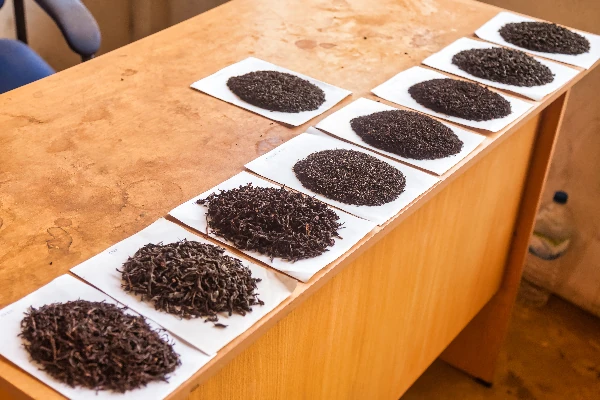
How can you reduce the caffeine content in black tea?
Reducing the caffeine levels in your cuppa might sound as tricky as herding cats, but it’s simpler than you’d think. Several methods can help you enjoy black tea without jittery nerves. Tweaking brewing times, adjusting water temperature, opting for decaf, blending with herbal teas, and selecting specific black tea varieties all come into play. Let’s have a nosey at these strategies, shall we?
Firstly, the length of time you let that tea steep makes a huge difference. Steeping black tea for shorter periods – seconds, not minutes – can literally cut the caffeine down to size. Switch up your brewing method, and you’ll be keeping your caffeine intake at bay. And when it comes to using cooler water, it’s more science than sorcery. Cooler temperatures extract fewer compounds, including caffeine. If you prefer a cooler approach, this tip is a no-brainer.
For those happy to live on the edge of tea purism, there’s the good ol’ decaffeinated black tea. Sure, it might lack a bit of the punch, but it’s still black tea and delivers a quiet but distinct ‘cuppa’ experience. And hey, blending your black tea with herbal teas is not just for the cool kids. It’s a crafty way to cut caffeine while adding unique flavours to the mix. Finally, choosing specific varieties that naturally contain lower caffeine levels can be a real eye-opener. Think Ceylon tea or Darjeeling – these folks have got your back.
How does shorter brewing time affect caffeine levels?
Steeping your black tea for a shorter time just means less caffeine ends up in your mug. It’s all about that sweet spot where flavour meets control. Shortening your steep time essentially means you’re getting the best of both worlds: the robust taste of black tea without turning into a caffeine-crazed lunatic.
- Less caffeine extraction: Caffeine needs time to be released from the tea leaves, so cutting the steep time keeps it minimal.
- Flavour preservation: Shorter brews can still maintain the tea’s aroma and taste, keeping it delightful.
- Quick preparation: Perfect for those mornings when you can’t afford to wait but still need your tea fix.
- Less bitterness: Over-steeping can make tea bitter, so keeping it short avoids that unpleasant aftertaste.
Give it a shorter brew and enjoy a balanced cup without the jitters, proving that less really can be more.
Can using cooler water reduce caffeine content?
Using cooler water for brewing black tea? Yep, it’s a thing, and it works like a charm. Cooler water ensures that fewer compounds, including caffeine, are extracted from the leaves. You get a milder, yet still tasty cup that’s kinder to your nerves.
- Lower caffeine extraction: Hot water extracts caffeine more efficiently, so cooler water slows things down.
- Gentler flavours: A cooler brew means a subtler infusion, preserving nuanced flavours.
- Reduced astringency: Hotter water can make tea more astringent and bitter, which cooler water definitely helps avoid.
- Comfortable drinking: You can sip it straight away without burning your tongue – always a win.
So, next time you brew, give the kettle a rest and opt for that cooler brew that keeps the heart racing less.
What are the benefits of opting for decaffeinated black tea?
Decaf black tea—let’s face it, it’s the bee’s knees for caffeine-sensitive folks and evening tea drinkers alike. By choosing decaf, you still get to revel in the deep flavours of black tea without sending your body into overdrive. It’s a marvellous compromise that doesn’t sacrifice too much on taste.
- Lower caffeine content: Obviously, the biggie here is the drastically reduced caffeine, making it suitable for all hours.
- Quality sleep: Sipping decaf in the afternoon or evening won’t mess with your sleep cycle.
- Rich flavour profile: Decaf tea still maintains the classic bold flavours of regular black tea.
- Digestive aid: Just like regular black tea, decaf can help digestion without the caffeine kick.
- Healthy antioxidants: You still get the health benefits like antioxidants from black tea.
In conclusion, decaf black tea lets you indulge without the caffeine-induced regret that often follows.
Back in the day, in 1833 to be exact, the British Parliament repealed the Tea Act of 1773, which had previously given the British East India Company a monopoly on tea sales in the American Colonies. This move led to an expansion of tea importation from places like China and India. The good news? This introduced various tea blends and variations that likely contained differing caffeine levels. Our ancestors may not have known it, but they were onto something – the humble beginnings of customising one’s tea to suit personal preferences arrived with this change.
You see, history’s got everything to do with why you can savour your perfect cup each morning (or night). Cheers to that!
Is black tea a better choice than coffee?
When it comes to choosing your everyday fuel – the nectar that jump-starts your brain in the morning – should you grab a cup of black tea or coffee? It’s like asking someone to pick their favourite kid. Both drinks have their perks and quirks, driven by caffeine content and health effects. So, let’s dispense with the chit-chat and dive right in.
First off, black tea and coffee both come armed with caffeine – that magical ingredient that transforms you from a groggy mess into a semi-functional human. However, they don’t pack the same punch. Coffee is like the heavyweight champion of the caffeine world, boasting nearly double the caffeine content of black tea. Yet, those seeking a gentler wake-up call often turn to black tea.
Switching gears, let’s talk health benefits. While coffee aficionados tout their drink’s antioxidant properties, reducing risks of certain cancers from colorectal to liver, black tea isn’t lagging. Think heart health guardian, potential stroke reducer, and even an oral health ally.
Mulling over side effects? Let’s not sugar-coat it. Coffee might leave you jittery, anxious, or even dealing with a sour stomach – not exactly the mellow morning vibe some folks crave. Black tea, in contrast, tends to be kinder on the nerves and stomach, offering a smoother path to feeling energised.
Finally, there’s flavour and culture. Coffee’s intense, earthy flavour profile stands in stark contrast to black tea’s robust yet nuanced taste. While coffee often chimes with hip, bustling cafés, black tea has a rich tradition spanning Asian and British heritage, embodying ritual and relaxation.
So, your choice should hinge on how much kick you need, your health priorities, and your flavour preferences. One isn’t categorically better than the other; it all boils down to what floats your boat.
How do the caffeine levels in black tea compare to coffee?
When you’re bleary-eyed in the morning, the caffeine content in your drink determines just how quickly you become a functional adult. If caffeine were a race, coffee would be Usain Bolt, and black tea would be more like your Sunday jogger.
- Coffee: 95 mg per average cup – the caffeine equivalent of a power drill to your drowsiness.
- Black Tea: 47 mg per average cup – think a gentle nudge rather than a full-on jolt.
- Espresso: 63 mg per shot – small but mighty, perfect for a quick pick-me-up.
- Green Tea: Around 28 mg per cup – great if you’re caffeine-shy.
- Decaf Coffee: About 2-5 mg per cup – for those who love the taste but not the buzz.
So, if you’re after a caffeine high and a rocket start to your day, coffee’s your go-to. But if you’re more about a gradual ascent to alertness, black tea fits the bill.
What are the health benefits of black tea versus coffee?
Now, you might be wondering if black tea or coffee is better for your health. Here’s the lowdown, no doctor’s jargon included:
- Boosted Alertness: Both drinks give you the perk-up you need, but in differing measures.
- Heart Health: Black tea’s rich in flavonoids that can improve heart health. Coffee, loaded with antioxidants, also supports heart function.
- Cancer Prevention: Coffee has potential to lower risks of colorectal and liver cancers. Black tea is on the front line against ovarian and breast cancers.
- Diabetes Management: Black tea might lower blood sugar levels, whereas coffee’s consumption shows a lowered risk of type 2 diabetes.
- Oral Health: Black tea contains polyphenols that can fight bacteria and improve oral hygiene. Coffee might have some protective effects but watch out for the stains.
So, both are healthy choices with their own unique benefits. Pick based on which health kick you’re aiming for.
Are there fewer side effects with black tea compared to coffee?
Alright, let’s get real – everything’s got a downside, even your morning magic potion. Let’s measure the side effects of these two beloved beverages:
- Jitters and Anxiety: Coffee, with its higher caffeine punch, can leave you feeling on edge. Black tea’s slower release is kinder in that department.
- Stomach Issues: Coffee’s acidity can be a nightmare for sensitive stomachs. Black tea’s gentler on the gut.
- Sleep Disruptions: Both can keep you awake if consumed too late, but coffee’s likely the worse culprit.
- Addiction and Dependence: Your body can get hooked on both, but coffee might be quicker to create a dependency.
- Teeth Staining: Both can stain your pearly whites, but drink in moderation, and you should be fine.
Imagine England in the 17th century – tea had just hit the streets (or should we say, the parlours?). It wasn’t just a drink; it was a status symbol. As tea grew popular, coffeehouses also spread like wildfire, becoming the social hubs of intellectuals and creatives. Samuel Pepys, famed diarist, once frequented these establishments. However, it was tea that ultimately ingrained itself in British culture, leading to the iconic Tea Act of 1773 and the Boston Tea Party – history dipped in caffeine, indeed.
Conclusion
As I reflect on the nuanced world of black tea and its caffeine content, it becomes evident that this popular beverage offers a wealth of both benefits and considerations. We’ve explored how the caffeine levels in black tea can vary significantly depending on the type of tea, brewing methods, and individual choice, revealing that, on average, a cup contains a moderate amount of caffeine when compared to coffee and energy drinks. This makes black tea an appealing option for those looking to harness the benefits of caffeine without the jittery effects often associated with higher-caffeine beverages.
The profound health benefits linked to black tea caffeine cannot be overstated, from enhancing cognitive function to supporting cardiovascular health and metabolism. These findings present a compelling case for incorporating black tea into a daily routine for those seeking a balanced approach to wellness. However, it’s crucial to also recognise the potential side effects, such as insomnia and increased heart rate, particularly for sensitive individuals or those on medications that might interact negatively.
To optimise the consumption of black tea, whether for its health benefits or as a delightful daily ritual, minding the recommended dosage and being aware of how brewing time and temperature can adjust caffeine levels is essential. Moreover, decisions regarding black tea versus coffee should be informed not only by caffeine content but also by personal health conditions and individual preferences.
In closing, I urge you to consider your own relationship with caffeine and how black tea might fit into your lifestyle. As we continue to learn about the effects of different beverages on our health, let’s approach our choices with curiosity and mindfulness. After all, in the words of Plato, “The greatest wealth is to live content with little.” So, how might a simple cup of black tea contribute to your wealth of well-being?
Resources
- An Improved Inception Network to classify black tea appearance quality
- Insights into the flavor profiles of different grades of Huangpu black tea
- The effect of black tea on human cognitive performance in a cognitive test battery
- Investigating the Impact of Tea Consumption on Cognitive Function and Quality of Life
- Antioxidant effects of tea: evidence from human clinical trials
- High Tea, Low Tea: the British Cultural Expansion of Tea, 1600-1900
- Health Benefits of Black Tea: A Review of the Scientific Evidence
- Varieties of Black Tea Health Benefits Research
- Antioxidative properties of black tea
- Black tea – helpful or harmful? A review of the evidence
- Is black tea consumption associated with a lower risk of cardiovascular disease and type 2 diabetes?


